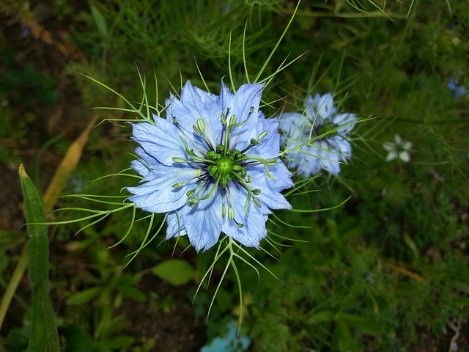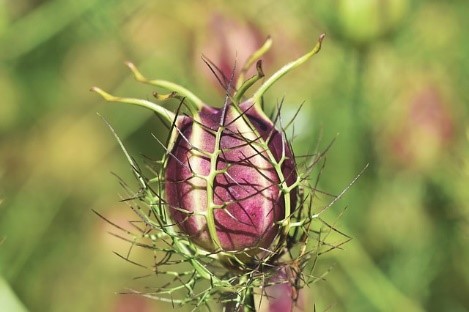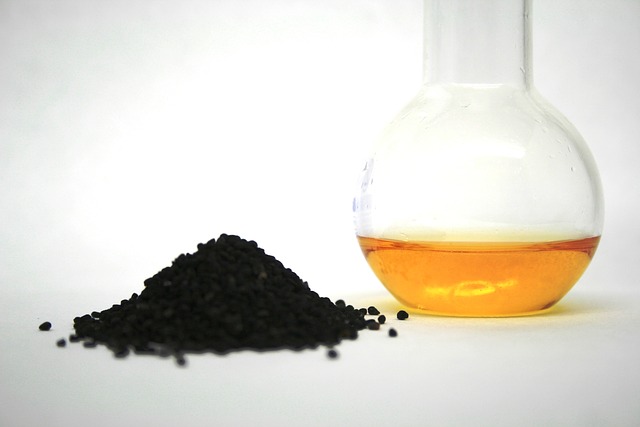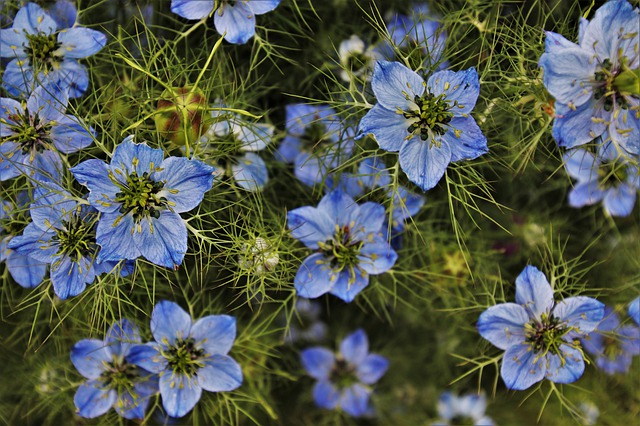Black Cumin (Nigella sativa)
Family – Ranunculaceae or Buttercup family
Black Cumin is an AMAZING herb. I became aware of it only recently during my study of herbs to help with COVID-19, for which, by the way it is perfectly suited. In terms of COVID, the seeds of this plant harmonize and strengthen the immune system while addressing almost all related symptomology. But, beyond COVID, Black Cumin is well studied and documented with uses that range from helping to stabilize and protect the nervous system, to improving mood, memory, and cognitive function. Black Cumin is often be used as a medicinal agent to protect and heal bacterial, viral and fungal infections. Additionally, it is frequently used to address gut dysfunction, reduce inflammation and to support and heal respiratory illness, not to mention that the oil is very helpful both internally and externally for pain. Believe it or not, that is not all. The uses go on and on. The prophet Mohammad said of this herb that it cures everything except death. Wow, no wonder these little black seeds have been used as medicine forever.
To learn more about using Black Cumin for the herbal treatment of COVID-19 read the following:
The following article contains affiliate links. Please assume, that if there is a link, I am an affiliate. That means, if you purchase a product through one of the links, I make a commission at no additional cost to you. I appreciate it each time you click on or make a purchase from one of my links. Rest assured, only superior products are suggested. Ones that I truly feel confident about. Thank you for your support.
Common Names
Nigella sativa means “Cultivated Black Seed.” Niger means black. Nigellus is for blackish or dark. Then Sativa means cultivated.
The plant Nigella Sativa (NS) is known by so many names around the world that it is impossible to name them all here. In English, the most used names include Blessed Seed, Black Seed, Black Cumin, Black Caraway, Fennel flower and Love in the Mist (I like that one). In Sanskrit and in the Arabic Unani-Tibb system of traditional medicine, Nigella sativa is called Kalonji. Kalonji is also an important trade name for the herb in the middle east. In Southwest Asia, Black Cumin is known as Karayal.
I know a lot of herbalists in the U.S. who simply refer to the plant as Nigella. However, it is important to know and understand the idea of species and genus if you’re going to use herbs medicinally. There are approximately 14 species of nigella. Sativa is the only one commonly used in healing. Remember the purpose of the name game is to be sure of what you’re getting. When placing an order or talking to an apothecary, N. Sativa is the one you want.
Interestingly, most common names vary depending on people, where they live and how their using the herb. If you’d like to dive into more of Nigella Sativa’s names and etymology, go to this website: Theblessedseed.com.
History and Background
Black Seed or Black Cumin is an annual flowering plant native to southwest Asia. The small black seeds have been used for centuries to treat diseases of the immune, digestive and respiratory systems. Wild NS can be found growing in parts of northern Africa, Turkey, Syria, Iraq, Iran and possibly parts of India. However, the plant has been widely cultivated since people started cooking and needing medicine. Therefore, most of what is sold in commerce comes from farmed crops.

Black seed has been considered a panacea in Islamic traditional medicine for centuries. The prophet Mohammad mentioned it in his hadith; the Egyptian Pharaohs reportedly used it. Black seed oil was even found in the tomb of King Tut. The Bible describes the herb as “curative black cumin” (Isaiah 28:25). The Greeks called it “Melanthion” meaning little black seed, where it was used mainly for women’s complaints.
Yet, Black seed was not only used for medicine. It has just as long a history as a culinary spice and beauty aid. Egyptian doctor, Mohamed Saleh, MD. said in his book, Black Cumin, the Magical Egyptian Herb, that it would be hard to imagine middle eastern or Persian cooking without this tasty spice.
Description of the Plant Nigella sativa
Nigella Sativa is a hardy annual plant that grows between 8 and 24 inches tall, stabilized by a well-developed tap root. The leaf structure is deeply divided with narrowly linear to threadlike leaf segments. The flowers range in color from white, yellow, pink, pale blue, or pale yellow. Each flower has 5 to 10 petals and numerous stamens. The flowers mature into a fruit capsule that contains several black triangular or pyramid shaped seeds.
The plant is reported to grow in a variety of soils but does best in sandy soils and in climates with strong, direct UV rays. It is perfectly suited to its homeland in the middle east.

Chemical Composition of Nigella sativa
The Chemical composition of Black Cumin is complex, containing more than 100 active constituents. Most of the constituents are tied into a natural combination of fatty acids, volatile oils, and trace elements. In fact, Black Seed contains 21% protein, 35% essential fatty acids, 38% carbohydrates and 6% other ingredients.
One of the active healing agents in Black Cumin is the volatile oil Nigellone, which has immune harmonizing effects. Another active constituent, nigellin, enhances the appetite and stimulates digestion.
More, the volatile or essential oil of these wonderful seeds contain quinone constituents. Being especially high in thymoquinone (TQ), a highly prized healing agent, TQ is shown to have neuroprotective qualities and is thought to be at least partially responsible for its analgesic, anticancer, antioxidant, anti-inflammatory, and antipyretic properties. Other functional components of the NS oil include p-cymene, carvacrol, thymohydroquinone (THQ), dihydrothymoquinone (DHTQ), α-thujene, thymol, t-anethole, β-pinene, α-pinene, and γ-terpinene.
As an important note, not all black cumin products are the same. Most of the Black Cumin oil on the market contains between .5 and 1.2% essential oils. The more essential oil in the seeds, the better the healing benefit. Moreover, the plants grown in sandy soil with intense sunlight typically contain more essential oils and fatty acids. I know of one company who makes an oil containing up to 3% essential oils, a very superior product. To find out more check them out at blessedseed.com.
Therapeutic Actions or Properties of Black Cumin
The therapeutic actions of Nigella sativa include uses as an antibacterial, antifungal, antihistaminic, antihypertensive, anti-inflammatory, antinociceptive (helps the sensory neurons block the detection of painful or injurious stimulus), antioxytocic (counters uterine contractions), antiparasitic, antiviral, diuretic, hepatoprotective (protects the liver), hypoglycemic (balances blood sugar), immune-potentiating, wound-healing, and as a respiratory-stimulant.
For an explanation or definition of therapeutic terms please click here.
Black Cumin is pungent, aromatic, slightly bitter, restoring and relaxing.
Parts or Preparations Used
The whole seed, oil, and standardized extracts are most used for medicinal, culinary and cosmetic purposes. The little black seeds can be prepared in a wide variety of ways including tea, tincture, salves, ointments, syrups and more.
It is important to know that only cold pressed oil is used for healing. All oils extracted through chemical or heat processes should be avoided because they destroy the valuable unsaturated fatty acids.

Standardized extracts usually take the form of capsulated oil and are standardized to 500 mg. Each batch is tested for impurities and measured for active constituents, which is handy way to take your Black Cumin if you prefer a capsule.
The Blessed Seed company has high quality cold pressed oils, herbal extracts, bulk seed and standardized extracts. These guys have great products, with very high essential volitle oil content. Where other companies products average 1.5% oil, these guys offer products up to 5% oil. To check them out or purchase their high quality products go to https://theblessedseed.com/
Medicinal Uses
Down through history, Black Cumin was considered a panacea or “heal all” by the people of Middle Eastern and Southwestern Asian countries. Some have even referred to it as magic. Although I do not know that any herb will heal everything, this is a certainly a versatile and effective herb.
Immune system and Black Cumin
The wide range of healing abilities demonstrated by Black Cumin stem from its ability to stabilize, harmonize and strengthen the immune system.
Our immune system is a large and complicated system. The main purpose of which is to fight off outside invaders and help our body heal itself. The immune system protects us from a host of microorganisms and pathogens including viruses, bacteria, fungus, and the like. It also stimulates wound healing, prevents cancer by removing mutated cells, and is responsible all phases of the inflammatory response.
We could, if you like, think of the immune system as an army protecting us and fighting off invaders. Like an army, our immune system contains not only soldiers (killer cells), but peacekeepers (suppressor cells), strategists (B cells or memory cells), clean up cells and more. Plus, Immune cells are in every part of our body. Everything works together to keep us healthy, healed and well.
When the immune system is out of balance, problems happen. Say there are too many killer cells, (these are the ones that attack and kill invading pathogens). The result is that our system starts to attack itself, confusing healthy cells with dangerous ones. When this happens, we may experience auto-immune diseases, rheumatoid arthritis, liver and kidney problems, or allergies to name a few.
If we do not have enough killer cells or if we have too many suppression cells, we may become more susceptible to infectious disease like colds or flus. Chronic infections are another possible outcome of too few killer cells, as are those mystery illnesses that seem to linger, the undiagnosable problems we start to think are in our own minds.
With Black Cumin, however, we can harmonize, strengthen, and stabilize the immune system. Helping it and us to regain lost balance. Then almost like magic, illness is resolved.
Below is a long list of issues for which Black Seed has demonstrated effectiveness. All of these, like almost all dis-ease roots in the immune system.
- Osteo Arthritis
- Rheumatoid Arthritis
- Sore throat
- Fever
- Influenza
- Improves memory and concentration
- Improves mood
- Decreases anxiety
- Improves cognitive function and memory
- Nervous system disorders
- Chronic Fatigue Syndrome
- Alzheimer’s
- Epilepsy
- Reduces the severity and duration of seizures
- Protects from future seizures
- Reduces frequency of Seizures in children
- Early stage Parkinson’s
- Eases opium withdrawal
- Digestion
- Digestive upset
- Diarrhea
- Gastric ulcers
- Colitis
- Hypertension
- Diabetes/metabolic syndrome
- Reduce neuropathic pain – oil is best
- Liver and kidney damage
- Edema
- Respiratory
- Reduce lung inflammation
- Asthma
- Cough
- Bronchitis
- Pain
- Reduce neuropathic pain
- Headache
- Encephalomyelitis (Inflammation of the brain and spinal cord)
- Acne
- Cancer
Some notable uses, with studies to back them up.
Nigella sativa showed the ability to reduce the severity, duration, and frequency of epileptic seizure, especially in children. One study showed that when 500 mg of the seed oil was taken daily for 6 months, children experienced up to 50% less seizure activity. In a separate study, children were given 40g of the cold pressed oil with the same results and no side effects.
A study of diabetes and Black Cumin treated type 2 diabetics with a combination of 900 mg capsulated black seed with 1.5 grams of turmeric. The results showed a reduction of fasting glucose levels, blood lipid levels, weight and triglycerides. Although there was a reported reduction of neuropathic pain, researchers suggest that the best results came from external application of the oil.
In one study 500 mg of Black Cumin was taken twice daily for 9 weeks. As a result, the treatment group demonstrated enhanced memory, attention and cognition when compared to the placebo group. This dosage was also shown to decrease anxiety, stabilize the mood and modulated cognition.
A study involving respiratory symptoms showed that 40 mg of the oil taken daily significantly improved allergy-related issues such as bronchial asthma, allergic rhinitis and atopic eczema. Up to 80 mg of the oil given to children over a period showed no adverse effects.
Suggested Dosages
- Standardized extract – 500 mg two or three times per day
- Tea or infusion – 1 teaspoon ground seeds are steeped in 8 oz boiling water for 15 minutes. Take 2 or 3 times per day
- Tincture – (1:5) 1-2 ml two or three times per day
- Oil – up to 25 drops (depending on the condition) 2 or 3 times per day
All preparations are suggested for at least 2 weeks and up to 6 weeks in duration especially when working with chronic conditions or poor immune function.
Recipes
Black Cumin Joint Cream
- 2 tablespoons black cumin oil
- 2 tablespoons freshly ground black cumin seeds
Place the black cumin oil in a small pot and warm it slowly over low heat. Add the seed powder, stirring together until it becomes inseparable. Allow to cool, and store in a cool, dry place.
Warm and apply to inflamed joints or arthritic joints as needed 2x per day. If an infection is present, apply the cream cold.
Black Cumin Tea
to stabilize immune function and reduce allergies.
- 1 tablespoon finely ground back cumin seeds
- 1 teaspoon licorice root
- 1 teaspoon crushed anise seeds
- 1 tablespoon loose leaf black or green tea
- 1 pint water
Mix the herbs and tea together and add to a teapot. Add hot water (not quite boiling). Steep for 10 minutes and sweeten with honey if desired.
Drink 1 cup up to three times per day for 4 to 6 weeks. This tea can also be used as an inhalation for respiratory problems.
Black Cumin Syrup
- 1 small clove garlic
- 2 tablespoons honey
- 1 teaspoon finely ground black cumin seeds
Crush the garlic with a garlic press or fork and mix with honey and ground seeds.
Take 1 teaspoon of the syrup daily before breakfast for 3 weeks. You can also add the honey to another herbal or black tea as desired or use it in water as an inhalation by diluting the entire mixture with 1-quart hot water.
Drug Interactions and Contra-Indications
There are no known side effects to Nigella Sativa. However, if pregnant, it is advisable to take avoid taking medicinal quantities because it may inhibit contractions. It is however thought to be safe to use as a spice.
As with any herb or substance. Listen to your body. Anyone can have reactions to any substance whether medicinal, food or otherwise. If you do not feel well after taking a new substance, Stop! Then call your healthcare provider or herbalist.
Disclaimers
The statements and ideas presented here are not intended to diagnose, treat, cure, or prevent any disease or condition. They have not been evaluated by the FDA. All ideas presented are for the sole purpose of education. To help you take control of your own health. If you have a health concern or condition, consult a physician. We suggest that you always consult a medical doctor before modifying your diet, using any new product, drug, supplement, or doing any new exercises.
These statements and products have not been evaluated by the FDA. They are not intended to diagnose, treat, cure, or prevent any disease or condition. If you have a health concern or condition, consult a physician. Always consult a medical doctor before modifying your diet, using any new product, drug, supplement, or doing any new exercises.
Herbs taken for health purposes should be treated with the same care as medicine. Herbal remedies are no substitute for a healthy diet and lifestyle. If you are serious about good health, you’ll want to combine diet, exercise, herbals, a good relationship with your doctor and a generally healthy lifestyle. No one of these will do it alone.
This information is designed to be used as part of a complete health plan. No products are intended to replace your doctor’s care, or to supersede any of his/her advice or prescriptions.


Pingback: An Herbal Interlude with Kava Kava (Piper methysticum) - Wonderment Gardens